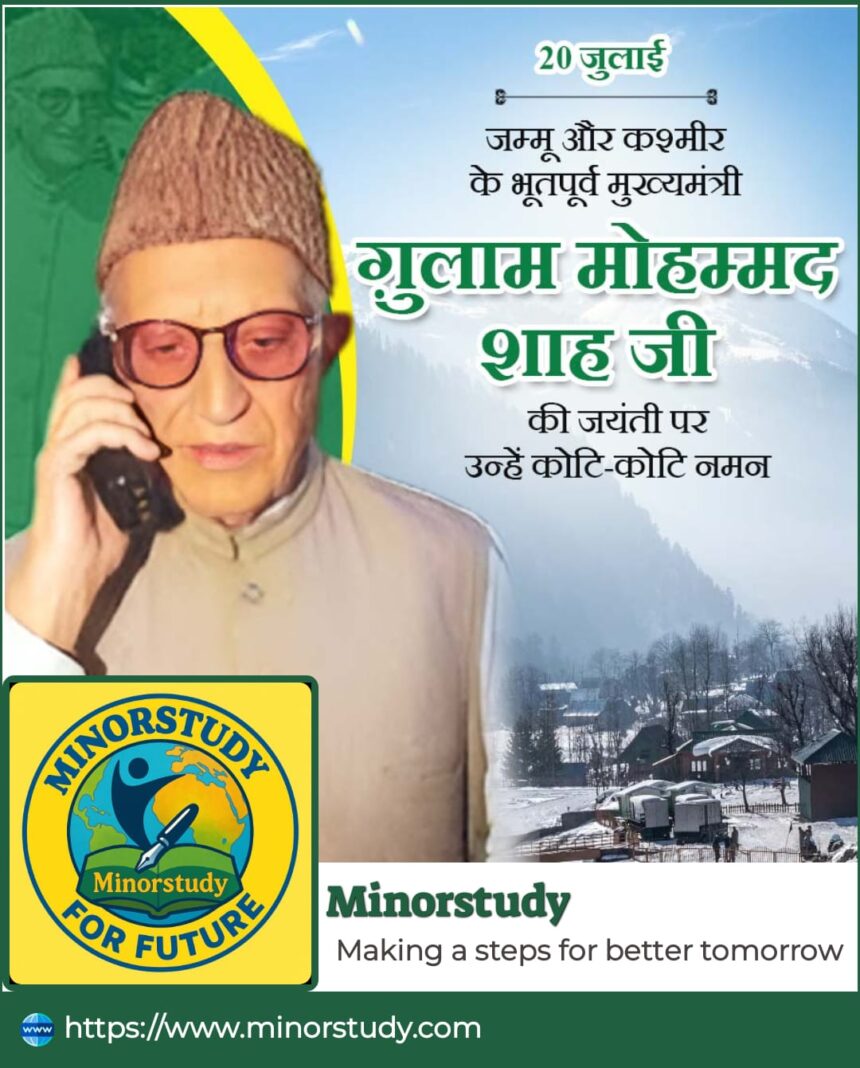📚 7 Controversial Yet Powerful Moments in Ghulam Mohammad Shah Ji Political Journey That Changed Jammu & Kashmir Forever
In the turbulent political history of Jammu and Kashmir, Ghulam Mohammad Shah Ji remains one of the most debated and dynamic figures. Known for his assertive leadership and bold decisions, he played a crucial role during one of the most sensitive periods in the state’s governance. Whether admired or criticized, his legacy has left an undeniable mark on the political fabric of the region.
- 🧬 Introduction – Who Was Ghulam Mohammad Shah Ji?
- 🧾 Historical Background of G.M. Shah Ji
- 🧭 Timeline of Key Events in Ghulam Mohammad Shah Ji’s Life
- 🧩 7 Powerful and Controversial Facts about Ghulam Mohammad Shah Ji
- 📌 Significance of Ghulam Mohammad Shah in Kashmir’s Politics
- 🔹 A Defining Figure of the 1980s
- 🔹 First Major Split in National Conference
- 🔹 Voice of Traditionalist Governance
- 🌐 Societal Impact and Importance
- ✔️ Political Awareness Among Citizens
- ✔️ Lessons in Political Pragmatism
- ✔️ Shaping Coalition Culture in J&K
- 💬 Frequently Asked Questions (FAQs)
- Q1. What was Ghulam Mohammad Shah’s biggest political move?
- Q2. Why was his tenure as CM controversial?
- Q3. What party did Ghulam Mohammad Shah belong to?
- Q4. What happened in 1986 during his rule?
- Q5. How is he remembered today?
- 🎉 Wishing and Remembering G.M. Shah Ji
- 🔍 Observance & Remembrance
- 🧠 Important Points to Remember
- 🧭 Daily Life Impacts and Legacy
- 🧩 Conclusion: The Man Who Dared to Change the Script
This article explores the history, significance, key milestones, facts, timeline, and societal impact of Ghulam Mohammad Shah Ji’s career, shedding light on a man whose name is etched in the chronicles of Kashmir’s political saga.
🧬 Introduction – Who Was Ghulam Mohammad Shah Ji?
Ghulam Mohammad Shah (often referred to as G.M. Shah) was a prominent Kashmiri politician, the son-in-law of Sheikh Abdullah and brother-in-law of Farooq Abdullah. He served as the Chief Minister of Jammu and Kashmir from 1984 to 1986 during one of the most politically charged times in the state’s history.
While his ascent to power was controversial, his governance introduced a unique phase in Kashmir’s political structure. He is remembered for both political pragmatism and tumultuous power transitions.
🧾 Historical Background of G.M. Shah Ji
Born in 1920 in Soura, Srinagar, Ghulam Mohammad Shah belonged to a family that was deeply entrenched in political thought and public service. He completed his education at Aligarh Muslim University and soon joined the Jammu and Kashmir National Conference (NC)—a party that shaped the valley’s political narrative.
His political career truly took off after marrying Begum Khalida Shah, the daughter of Sheikh Abdullah, which further solidified his place within the inner circles of Kashmiri leadership.
🧭 Timeline of Key Events in Ghulam Mohammad Shah Ji’s Life
| Year | Event |
|---|---|
| 1920 | Born in Soura, Srinagar, Jammu and Kashmir |
| 1950s-60s | Joined National Conference; participated in administrative roles |
| 1975 | National Conference returned to power under Sheikh Abdullah |
| 1982 | Sheikh Abdullah passed away; Farooq Abdullah became CM |
| 1984 | Shah rebelled against Farooq and became CM with Congress support |
| 1986 | Communal riots broke out; Governor’s Rule imposed |
| 2009 | Passed away at the age of 88 |
🧩 7 Powerful and Controversial Facts about Ghulam Mohammad Shah Ji
Toppled His Brother-in-law’s Government:
In 1984, Shah led a dramatic political coup against his brother-in-law Farooq Abdullah, by garnering support from 26 NC MLAs and the Indian National Congress, eventually becoming CM.Formed the Government with Congress Support:
This coalition, though legal, was seen as morally controversial, given the family dynamics and political betrayal involved.Known as the “Gul Shah Sarkar” Era:
His tenure as CM was often criticized but also recognized for attempts at streamlining administration and infrastructure push, including development in rural areas.Communal Riots & the Fall of His Government (1986):
His government fell after communal riots in South Kashmir, which led to the imposition of Governor’s Rule. Critics cite this as a result of weak public handling.Political Comeback Attempts:
He founded his own party—the Awami National Conference (ANC)—to continue his political activities, though it didn’t find major success.Known for Bureaucratic Control:
During his rule, he ensured that administrative machinery worked swiftly, reducing delays in developmental works, even if political consensus suffered.Death & Legacy (2009):
He passed away in 2009, leaving behind a complex and divisive political legacy that is still discussed in Kashmiri politics.
📌 Significance of Ghulam Mohammad Shah in Kashmir’s Politics
🔹 A Defining Figure of the 1980s
Shah Ji represented a shift in Kashmir’s leadership style. While Farooq Abdullah was more populist and international-facing, G.M. Shah was an insider, a political tactician who tried to steer governance with tighter control.
🔹 First Major Split in National Conference
His rebellion marked the first major political fissure in the National Conference, leading to re-alignment with the Congress, which had far-reaching consequences.
🔹 Voice of Traditionalist Governance
Despite criticisms, his leadership focused on rural development, road-building projects, and restructuring bureaucracy, which earned him localized support.
🌐 Societal Impact and Importance
✔️ Political Awareness Among Citizens
His unexpected rise to power sparked public discourse on democracy, loyalty, and ethics, triggering political awareness especially among the youth.
✔️ Lessons in Political Pragmatism
G.M. Shah’s career is a case study in how political ambition intersects with familial loyalty, offering valuable insights into realpolitik.
✔️ Shaping Coalition Culture in J&K
His short-lived alliance with the Congress created a precedent for coalition politics in Jammu & Kashmir, influencing future governments.
💬 Frequently Asked Questions (FAQs)
Q1. What was Ghulam Mohammad Shah’s biggest political move?
His most notable move was the ousting of Farooq Abdullah in 1984 and becoming Chief Minister with the support of Congress MLAs.
Q2. Why was his tenure as CM controversial?
It involved family betrayal, fragile coalition politics, and eventually led to communal unrest which destabilized governance.
Q3. What party did Ghulam Mohammad Shah belong to?
Initially, the Jammu & Kashmir National Conference, but later he created his own party, the Awami National Conference (ANC).
Q4. What happened in 1986 during his rule?
Communal riots in South Kashmir led to widespread criticism of his governance, resulting in Governor’s Rule being imposed.
Q5. How is he remembered today?
As a controversial but pivotal figure, whose political choices still fuel debate on loyalty, governance, and ethics in Indian democracy.
🎉 Wishing and Remembering G.M. Shah Ji
“Remembering Ghulam Mohammad Shah Ji, whose political courage and strategic leadership marked a transformative era in Jammu & Kashmir’s political history. May his legacy continue to inspire discourse and democratic evolution.”
On his birth and death anniversaries, political parties, historians, and analysts revisit his contributions and controversies, offering new interpretations for the next generation.
🔍 Observance & Remembrance
Political seminars are held in Kashmir and Delhi to analyze his era.
Local leaders and activists use this occasion to reflect on governance challenges.
Documentaries and articles emerge during anniversaries, exploring his role in Kashmir’s fragile power dynamics.
🧠 Important Points to Remember
G.M. Shah Ji’s leadership was brief but deeply impactful.
He embodied a blend of loyalty, rebellion, and ambition.
His governance sparked developmental debates and coalition experiments in J&K.
He is a key historical character for understanding Kashmir’s political fabric of the 1980s.
🧭 Daily Life Impacts and Legacy
Even today, Shah Ji’s governance methods—focused on development without populist noise—are discussed in policy circles. His firm grip on administration, despite lacking mass appeal, presents a model of alternative governance.
His career also reminds citizens to remain vigilant, politically informed, and conscious of the ethical dimensions of leadership.
🧩 Conclusion: The Man Who Dared to Change the Script
Ghulam Mohammad Shah Ji legacy is not merely one of controversy—it is a legacy of bold choices, political maneuvering, and administrative intent. He may not have been universally loved, but he dared to change the political narrative, even if it came at a personal and public cost.
His life is a mirror to every Indian voter and leader—a reminder that democracy is not only about power but about decisions that echo through generations.








